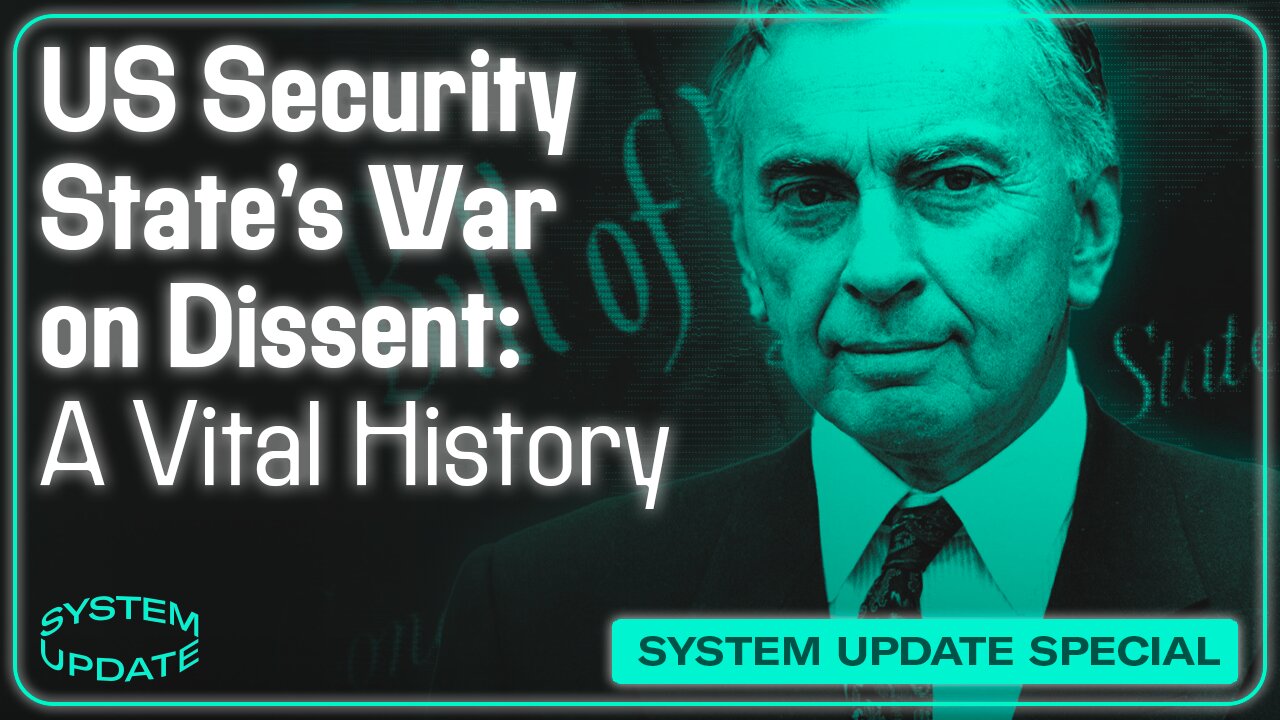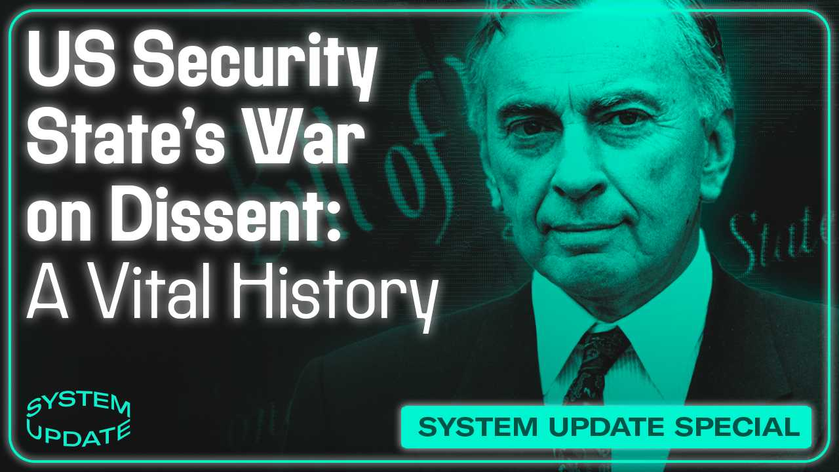Watch the full episode here:

Good evening. It's Friday, October 6.
Tonight: One of the primary topics we cover on System Update is the abuse of the U.S. Security State and its vast powers – the CIA, NSA, FBI, DHS – for domestic political purposes. When the U.S.. Security State was created in the aftermath of World War Two, the central taboo was that it would never turn its powers inward. It was permitted to operate in total secrecy and use often lawless methods because it was intended to focus only on foreign enemies and to interfere in the internal affairs of foreign adversaries but was never to be weaponized in American politics or turned against the American people.
There is now abundant evidence that leaves no doubt that this taboo simply no longer exists. Whistleblowers within these agencies who risked their liberty over the last 25 years to reveal the agency's secrets did so because they said they were so offended and horrified that the weapons of the security agencies were now being regularly turned on the domestic population that the CIA directly and aggressively interfered in and manipulated. Both the 2016 and 2020 presidential elections are beyond dispute. Both the Russiagate collusion conspiracy theory of 2016 and the 2020 lie that the Hunter Biden laptop was Russian disinformation came directly from the bowels of the CIA and was fed to The New York Times and the Washington Post. Just last month, an appellate court ruled that the FBI and other agencies within the Biden administration committed one of the most egregious and systemic violations of the First Amendment in decades, if not ever, by systematically pressuring Big Tech platforms to censor the political speech of Americans that they dislike. That's just a small sample. The story shows grave and constant domestic repression by these intelligence agencies.
It may sometimes seem that this is a fairly new development. After all, most people's adult political lives now are no longer shaped by the Cold War, but by the 9/11 attacks and the subsequent War on Terror in which the CIA Homeland Security and FBI largely came to focus not on the domestic population, but on foreign terrorist organizations. As a result, most of our controversies over the last 25 years involving the U.S. Security State before the Trump age were typically about programs justified in the name of fighting foreign enemies rather than domestic ones. Controversies over torture programs, CIA black sites, due process-free zones at Bagram and Guantanamo, mass warrantless spying, drones and regime change wars were all typically justified by the need to stop foreign threats.
This was always deceit – pure propaganda. Most of the key War on Terror controversies ended up having significant implications for the domestic civil liberties of American citizens, if not being principally about them. Radical programs like the Patriot Act and the NSA's warrantless surveillance program had a far greater impact in eroding the core of the civil liberties of American citizens on American soil than they did foreign terrorist groups. But the framework for how we debated and understood those controversies and the justification offered by the U.S. government for them were always focused on foreign threats rather than domestic ones.
The 20-year War on Terror, with its ostensible focus on foreign threats, has thus created the misleading perception that the U.S. Security State's domestic focus and interference in our domestic politics is a somewhat new development. For so many reasons, though, that is simply false. The decade prior to the 9/11 attacks in the War on Terror and the Clinton years of the 1990s were driven at least as much by a civil liberties assault on the domestic political rights of Americans as was true of the Trump era. But for al-Qaida and ISIS and the Russians, we were told back then that the greatest threat we faced was not foreign threats, but domestic ones, specifically anti-government extremism on our own soil that questions the legitimacy of the federal government. Over and over, the multiple sprawling arms of the U.S. Security State in the 1990s were used to target, surveil and repress what the U.S. government considered anti-government, anti-establishment extremism, just as is true of today – you can draw a straight line from those controversy in the 1990s to the ones today.
For that reason, it's really impossible to understand the multiple ways that the U.S. government today is attacking core liberties at home without understanding the foundation that was laid for all of this in the 1990s. The alleged threat posed by so-called domestic anti-government extremists was aggressively exploited by the Clinton administration to demand a wide array of new and previously unthinkable powers designed to control police and suppress domestic dissent, including things like backdoor access to all Internet sites and encryption protections, and even chips on phones that would trace everything we say and did. All of this became quite visible with two violent attacks by U.S. federal law enforcement agencies in that decade: One against a family said to be white separatists in Idaho, in which the FBI conducted an 11-day siege at Ruby Ridge and then killed Randy Weaver's wife, son and dog, and then, the notorious warlike assault against the Branch Davidians at Waco, Texas, under Janet Reno's Justice Department. A vicious and violent government domestic assault led to 76 members of that group, including 28 children, dead.
There is no way to understand the Senate's grave and growing threat to the core of civil liberties and political dissent posed by the U.S. Security State without understanding the historical context in which this all emerged in the 1990s. It is the political transformation of Gore Vidal, one of the most celebrated liberal literary, cultural and political figures of the 20th century, who became an outspoken opponent of the U.S. Security State in the 1990s, and the liberal attempt to weaponize it against political enemies, that provides the perfect window to understand this crucial history.
We're aware that, especially in today's Internet culture of immediate gratification, it's sometimes difficult to get people to focus on anything other than the fleeting news events of the last 12 hours. But we have seen repeatedly that our audience wants more than that, and some of our most watched shows have been the ones where we took the time to put events of today into their crucial historical and cultural context. So, regarding the current exploitation of the power of the U.S. Security State to limit and punish domestic dissent, a frequent topic of our program. putting it into its key historical context is what we're going to do tonight, and we think you will find it compelling.
For now, welcome to a new episode of System Update, starting right now.






















